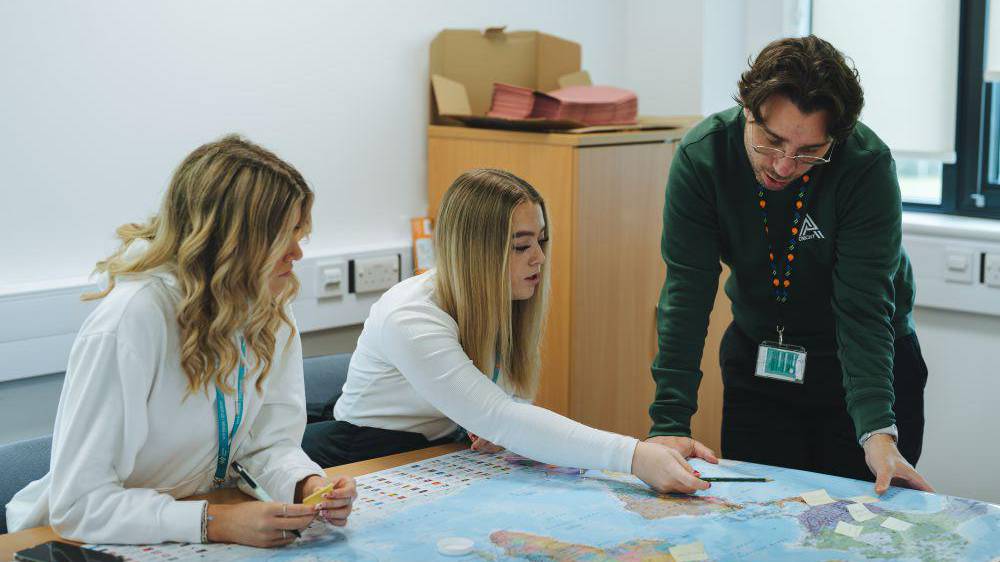Foundation Degree (FdA) Hospitality, Tourism and Events Management
Key Details
- Available at:Rhos-on-Sea
- Study Mode:Full-time
- Course Length:
Full-time: 2 years. Monday & Wednesday, 9am - 5pm
- UCAS Codes:NNHT
Foundation Degree (FdA) Hospitality, Tourism and Events ManagementUniversity-level Courses
Part Time
If you are applying to study part-time you can apply directly to the campus of your choice.
Full Time
There are two ways to apply to study for a full-time higher education course - either through UCAS or directly to the college.
Applying through UCAS:
You should apply through UCAS if you are currently studying for A Levels, a vocational Level 3 course (i.e. BTEC) or an Access to Higher Education qualification, or if you wish to apply to more than one higher education provider.
There are two ways to apply to study for a full-time higher education course - either through UCAS or directly to the college.
Course Description
Under development for course re-validation and approval for September 2024, content and modules may change.
This Foundation Degree in Hospitality, Tourism, and Events Management is designed to furnish you with the essential business management skills and hands-on expertise sought after by leading employers in the global hospitality, tourism, and events industries.
The immersive nature of the course ensures that you develop the theory and practical knowledge necessary to excel in these dynamic sectors.
Situated in north Wales, a renowned global tourist destination, our location provides a unique learning environment. With an array of hospitality, tourism and events organisations in close proximity, you'll have abundant opportunities for engagement, visits to distilleries, various attractions and potential work experience. This course is ideal for those interested in both entering the sector, or to further their promotion and management opportunities within the sector.
Modules include:
Year 1 (Level 4)
- Understanding Food & Beverage Operations
- Revenue & Cost Control
- Financial Management within Hospitality, Tourism & Events
- The Art of Influence: Marketing & Consumer Behaviour
- Engaging Stakeholders through Innovation
- Destination Everywhere: An Introduction to Worldwide Tourism
- Research & Study Skills: Unlocking Academic Success
- Professional Profile & Personal Development
- Wines & Beers in Hospitality, Tourism & Events
- Event Context: Understanding the Significance of Events
Year 2 (Level 5)
- Strategic Research Techniques
- Designing & Executing Experiences
- Sense of Place
- Enhancing Organisational Performance via Information Technology
- Human Resource Management
- Customer Centric Expertise
- Unique Experiences: Special Interest Tourism & Events
- Resource Management
- Responsible Tourism Management
Entry Criteria
Academic Requirements
- 48 UCAS points from suitable Level 3 qualification (A level, BTec National Certificate, AVCE, GNVQ, International or Welsh Bacc, NVQ Level 3).
- GCSE in Maths/English grade C/4 or above or key/essential skill equivalent
Language Requirements
- GCSE Welsh/English first language grade C/4 or above.
- IELTS 5.5 or higher
Other:
A wide range of non standard professional qualifications and relevant experience will also be considered.
If your qualifications do not meet the entry requirements listed above, we would still encourage you to apply for the course you're interested in, as many of our courses will consider learners based on their previous work and skills experience rather than their qualifications.
All places are subject to satisfactory interview.
If your qualifications do not meet the entry requirements listed above, we would still encourage you to apply for the course you're interested in, as many of our courses will consider learners based on their previous work and skills experience rather than their qualifications.
Delivery
This course is delivered through a blend of the following:
- Lectures
- Practical skills sessions
- Presentations
- Workshops
- Group work
- Guest speakers
- Industry visits
- Seminars
- Guided tasks
- Tutorials
Delivered primarily through a face to face in class approach with opportunities for online delivery as appropriate.
Timetable
- Full time - 2 years, 2 days per week (typically 9am - 5pm)
- Part time - 4 years, 1 day per week (typically 9am - 5pm)
Fees
Visit our course fees page for information on full and part-time degree course fees.
Financial Support
Visit our financial support page for information on the range of support available.
Additional costs
During the programme, students are encouraged to take up opportunities to become members of other professional bodies, which can incur additional costs. As part of the programme, external visits may also take place that would require a financial contribution from the student. The above is given as guidance, and further costs could also be incurred dependant upon opportunities.
Additional costs may be associated with the following:
- Materials for independent study (laptop computer, study materials etc.)
- Specialist uniform(s) as appropriate for work placement
- Costs for external visits including travel and subsistence
- Additional hospitality, tourism or events related qualifications
- Travel and subsistence for work placements
More detailed information on other costs associated with your course and work placements/work experience (if applicable) will be outlined in the programme validation document and explained to you at your interview.
Modules
More detailed information on Modules is to be found in the ‘Additional Campus/Course Information’ section.
Start date
September
Contact:
For specific course enquiries, please contact:
Claire Jones (Programme Leader): jones37c@gllm.ac.uk
Celine Rea (Administration): rea1c@gllm.ac.uk
For general enquiries about our degrees, please contact: degrees@gllm.ac.uk
Assessment
The course is assessed through various methods, for example through a blend of the following:
- Essays
- Reports
- Exams
- Portfolio
- Practical skills demonstration
- Case studies
- Time constrained assignments
- Presentations
Feedback
Where relevant, assessments will be marked and returned to students with constructive and developmental feedback. Effective feedback combines information which enables students to understand the strengths and limitations of their past performance, and information which enables them to recognise how future performance can be improved. Students will be provided with feedback in a timely manner and this feedback will justify how the grade has been awarded. Students will have the opportunity to reflect on the feedback given and identify their strengths, things they found challenging and areas for development that they will feed forward to their next assessment. Feedback will include linking evidence to assessment criteria to demonstrate how the student will have met the learning outcomes.
Progression
Progression to further study:
- Direct progression to L6 BA(Hons) Hospitality, Tourism & Events Management (top up)
- Further study with other UK HE providers
- PGCE
- On completion of level 6 possibility to progress to relevant masters degree.
Career Opportunities and Progression:
- Hospitality / Tourism / Events management positions in a variety of industry based organisations.
- Opportunity to join graduate training schemes.
- Opportunities within the various strands of the Hospitality, Tourism and Events industries.
Campus Information Rhos-on-Sea
Module Information
The course consists of the following modules, which are available to all part-time, full-time students or on a module only basis.
For every 10 credits, students should engage with around 100 notional hours of learning. This will be approximately 30% direct learning contact and 70% independent student learning.
Level 4 Modules
Understanding Food & Beverage Operations (10 credits, compulsory)
Introduction to the food and beverage aspects of the wider hospitality industry investigating the different facets of the industries make up.
Essay (50%) / Essay (50%)
Revenue & Cost Control (10 credits, compulsory)
Exploration of the significance of revenue, costing, and financial analysis within the HTE domain, emphasising the practical application of accounting methods and techniques within the HTE industry context.
Portfolio (50%) / Open Book Exam (50%)
Financial Management within Hospitality, Tourism & Events (10 credits, compulsory)
The business finance module will lead further into understanding the nature of business finance and how the key principles and concepts of financial practices can help businesses interpret financial information and utilise this data to make sound financial decisions.
Email Communication (50%) / Open book exam (50%)
The Art of Influence: Marketing & Consumer Behaviour (20 credits, compulsory)
This module aims to define customer service and marketing highlighting their functions within service contexts, explaining their applications within the Hospitality, Tourism & Events industries and aiming to highlight the psychology of how consumers think, feel, reason.
Marketing campaign rationale (25%) / Marketing campaign display (25%) / Classroom debate (25%) / Debate notes (25%)
Engaging Stakeholders through Innovation (20 credits, compulsory)
This module aims to equip students with the skills to build meaningful connections with stakeholders through innovative techniques and strategies.
Pitch simulation (60%) / Reflective evaluation (40%)
Destination Everywhere: An Introduction to Worldwide Tourism (10 credits, compulsory)
This module provides an overview of the Travel and Tourism Industry in a UK and global context. It examines the key components and interrelationships within the industry, including the roles of private, public and voluntary sectors.
Reflective essay (40%) / Poster/Infographic presentation (60%)
Research & Study Skills: Unlocking Academic Success (10 credits, compulsory)
The RSS module aims to develop the study skills of the learner, enabling the production of sound academic writing and introducing the concept of critical thought. It will enable students to develop skills in academic research, writing and reflection
Portfolio of Exercises (100%)
Professional Profile & Personal Development (10 credits, compulsory)
The PPPD module is designed to empower learners to execute various employment-related assignments. These tasks are collaboratively determined with employers/industry representatives focusing on enhancing learners' ability to present themselves effectively as prospective employees within the contemporary HTE industry.
Portfolio of Exercises (100%) / Work Placement (Pass/Fail)
Wines & Beers in Hospitality, Tourism & Events (10 credits, compulsory)
WBCW will consider the history of the production of wine and beer and their place in society with a particular emphasis on the links to HTE. Wine and food matching will be explored along with the more contemporary beer and food matching.
Poster & Presentation (50%) / Open Book Timed Assignment (50%)
Event Context: Understanding the Significance of Events (10 credits, compulsory)
Within this research module you will delve into the intricate dynamics of events, exploring the underlying motivations behind societies' creation of events and their profound impacts on host communities, the environment, economy, culture, and tourism.
Coursework portfolio (60%) / Case study (40%)
Level 5
Strategic Research Techniques (10 credits, compulsory)
The SRT module aims to enable students to apply a range of enhanced research and academic writing skills appropriate to the study of hospitality and culinary arts both in general and as applied to specific contexts.
Research Proposal 100%
Designing & Executing Experiences (20 credits, compulsory)
The Designing & Executing Themed Experiences module aims to provide students with the opportunity to demonstrate a range of practical skills and theoretical knowledge that will build on previous learning. The module will equip learners with the various skills needed to arrange, coordinate, run and evaluate a food and beverage themed experience or event.
Practical Themed Event 70% / Reflective Report 30%
A Sense of Place (20 credits, compulsory)
This module aims to provide students with the foundations to understanding cultural differences, nuances and sensitivities whilst raising their awareness and understanding of the importance of cultural diversity within Hospitality, Tourism & Events Management.
Group display (60%) / Vlog (40%).
Enhancing Organisational Performance via Information Technology (10 credits, compulsory)
The module aims to enhance students' awareness of technological developments spanning the last 30 years and the range of issues that are brought into play when organisations consider how to manage and use data in enhancing the quality of decision making.
Short report (40%) / Group podcast (60%)
Human Resource Management (10 credits, compulsory)
HRM module aims to enable students to understand the development of HRM within Hospitality, Tourism & Event contexts. It will discuss the principal functions and activities of Human Resource Management and the contribution to the achievement of organisational objectives.
Case study report (100%)
Customer Centric Expertise (10 credits, compulsory)
This module aims to introduce students to the theory and application of guest service management and customer experience methods and operations in the hospitality, tourism and events sectors.
Brand analysis report (60%) / Presentation (40%)
Unique Experiences: Special Interest Tourism & Events (10 credits, compulsory)
This module provides an in-depth exploration of special interest tourism and events, focusing on the various forms, motivations, and impacts associated with niche tourism markets and specialised events.
Client proposal Pt 1 (60%) / Client proposal Pt 2 (40%)
Resource Management (10 credits, compulsory)
The Resource Management module aims to equip learners with the knowledge and understanding needed to identify and acknowledge how resources are effectively managed across a range of provision and culinary and hospitality business models.
Case Study 100% / Work Placement (Pass/Fail)
Responsible Tourism Management (20 credits, compulsory)
The Responsible Tourism Management module equips students with principles, practices, and challenges of responsible tourism, fostering effective leadership for Global sustainable destination development.
Essay (50%) / Group case study analysis & presentation (50%)
Other details
Course type: University-level Courses
Level:
4+5
Programme Area:
- Business and Management
- Hospitality and Catering
- Travel and Tourism
Awarding Body: Bangor University
Bilingual:
n/aBusiness and Management
Learn more about this area and see our course level guide:

Hospitality and Catering
Learn more about this area and see our course level guide:

Awarding Body


